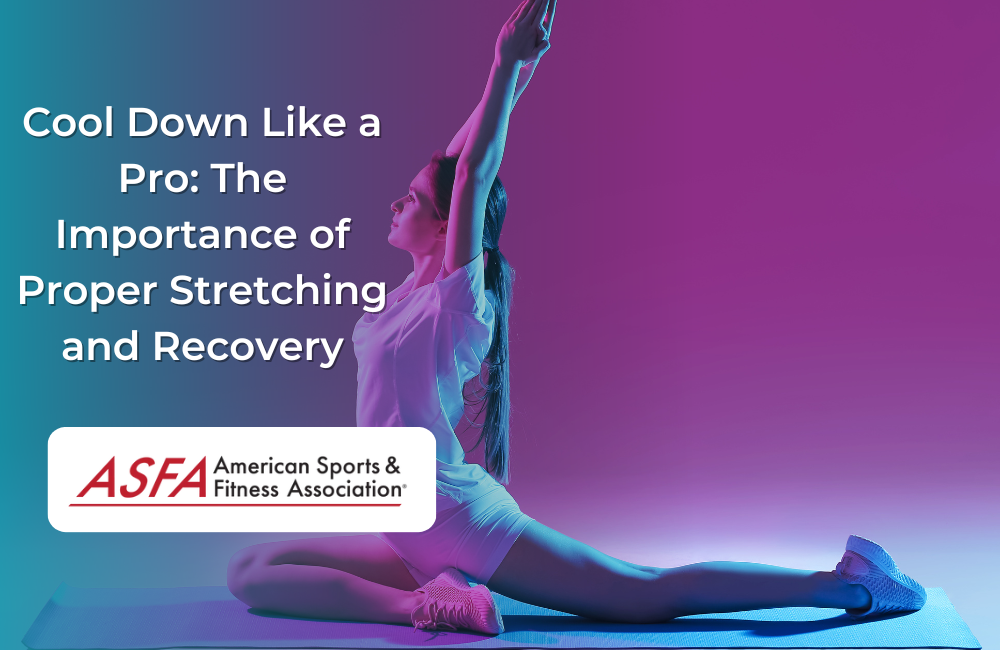Cooling down is an essential part of any workout routine. Cooling down allows your body to recover from exercise, which is essential for overall health and wellness. A proper cool-down also prevents injury, soreness and other negative side effects you can experience after exercising hard.
Stretching is the most important part of cooling down.
Stretching helps prevent injury and muscle soreness, promotes flexibility and ease of movement, and should be done immediately after a workout or any time you feel your muscles are tight or stiff. You should also stretch before bedtime for better sleep quality. Stretching can be done anywhere: at home, in the office (if it's allowed), even on public transportation!
No matter how hard you push yourself during a workout, you need to allow your body time to recover and repair itself.
No matter how hard you push yourself during a workout, you need to allow your body time to recover and repair itself. Stretching is one of the best ways to do this. It helps prevent injuries by improving flexibility and range of motion, which improves strength in your muscles. It also reduces muscle soreness after exercise and improves posture by stretching out tight muscles that pull on bones or joints.
Stretching is especially important if you have back pain or knee pain because it can help relieve those symptoms by increasing blood flow through tight areas in the body (such as hamstrings). A good rule of thumb when stretching after working out: if there's any sort of sharp pain then stop doing whatever stretch was causing it!
The muscles and connective tissues in your body can experience micro-tears during exercise, which cause soreness.
Stretching is an important part of recovery and should be done after every workout. The muscles and connective tissues in your body can experience micro-tears during exercise, which cause soreness. This is a good thing! It means that you're making progress toward becoming stronger and more flexible. You should feel some tightness or soreness after a good workout, but if it lasts for more than 24 hours or is accompanied by pain, see a doctor immediately (especially if it's accompanied by swelling).
Soreness will go away within 2-3 days if you stretch regularly--and even faster if you stretch intensely before bedtime each night!
Stretching helps prevent injury and muscle soreness. It also boosts flexibility, which makes for easier movement - even when you're not working out.
Stretching can be done at any time of day or night, whether you're on your couch watching TV or waiting in line at the grocery store. You don't need any special equipment or even clothes (though stretching while wearing loose clothing makes sense). You just need an open space and some time!
Stretching is often the first thing we do after a workout, but it's also good to get in some stretching before you hit the gym. This helps prepare your muscles for activity and prevents injury from over-exertion. Stretching can be done with or without equipment and is easy to fit into any schedule.
Experts recommend stretching for at least five to ten minutes after a workout. You should also consider stretching before exercising, too.
Stretching is an important part of any fitness routine. It helps prevent injury and increases flexibility, which makes your body more limber for everyday activities. Stretching before a workout can help with muscle warm-up, while stretching after a workout helps with recovery and repair.
Stretching is especially important for people who are older or have health issues like arthritis, because it reduces joint pain caused by poor posture or tight muscles that lead to poor circulation throughout the body. For athletes who need to keep their bodies performing at optimal levels during competition seasons, stretching is also essential - even if they don't have time for formal exercise programs.
The best times to stretch are immediately after completing an intense workout session and before bedtime.
The best times to stretch are immediately after completing an intense workout session and before bedtime. Stretching after your workout will help with muscle soreness, while stretching before bedtime can help you sleep better. Stretching at other times of the day is not as important because it won't provide much benefit unless you're just really into it!
Stretching is especially helpful if you feel like your body needs to cool down after exercising or if there is any tightness in the muscles due to exercise or injury. Stretching helps by increasing blood flow and decreasing tension in the muscles, which reduces pain levels during activity (or afterward).
Takeaway
The takeaway: Stretching is an important part of a workout routine. It helps prevent injury and muscle soreness, improve flexibility, and should be done regularly.
You can stretch before or after exercise--or both! If you're feeling stiff after a workout, try stretching as soon as possible. And if you're feeling tight before your next session (or even during), spend some time warming up with some light cardio or dynamic stretches.
The bottom line? Stretching is essential for any athlete who wants to stay healthy and perform their best in the gym or on the field.
Conclusion
The best way to cool down is by stretching. Stretching helps keep your muscles and connective tissues healthy, which can reduce the risk of injury and muscle soreness. It also boosts flexibility, which makes for easier movement - even when you're not working out. So next time you finish an intense workout session or even just want to relax at home on the couch after work? Take a few minutes to stretch!





